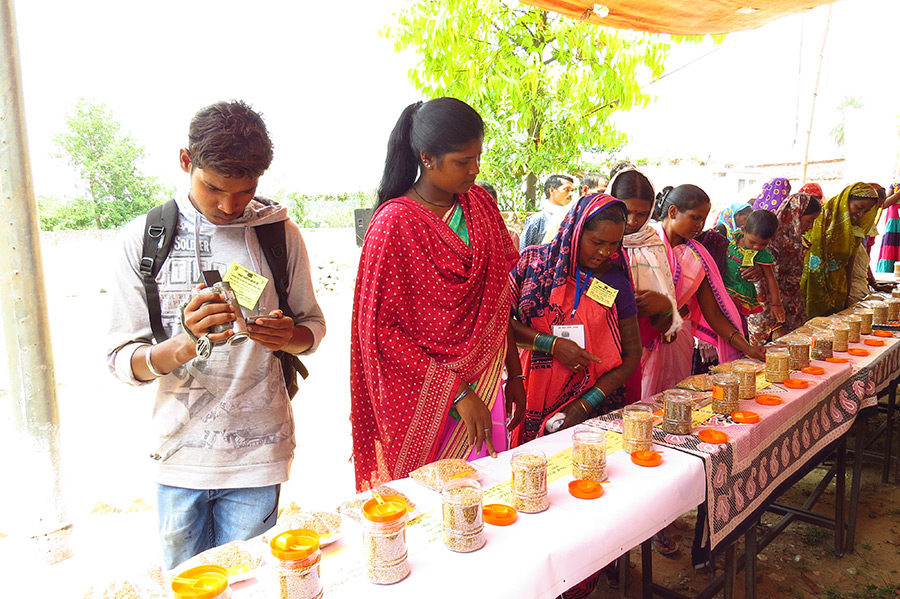LIVELIHOOD

With over 127 agro-climatic zones, the Indian agricultural landscape is a diverse one. For paddy alone, there are over 1 lakh indigenous varieties cultivated in the country. Out of these, Chhattisgarh cultivates approximately 19,000 indigenous varieties. For the abundance of these varieties, quality seeds are the most essential, since they help in increasing productivity and decreasing expenses on chemical fertilizers and pesticides.
Each paddy variety cultivated in Chhattisgarh has distinct nutritional and medicinal properties, different flavor, fragrance, colour, shape, size, stress tolerance as well as socio cultural significance. Some varieties are even resistant to pests, diseases, drought and flood conditions. For example, “Luchai” a local variety from Jashpur district is resistant to water logging. Another variety, ‘Barahasal’ from this region is scented, thick and a short duration rice preferred for Poha.
Traditional farmers in the state had long understood the crop cycles of different varieties, hence they focused on growing the most suitable variety with a compatible life-cycle, within specific agro-climatic conditions. They understood that traditional seeds were not just economically practical, but also environmentally suitable since hey helped conserve local agro biodiversity. However, over the last decade or so, traditional varieties are becoming increasingly unavailable in many local communities. With Multinational corporates foraying into farming, traditional agricultural practices have started fading away. Nowadays, farmers are increasingly purchasing genetically engineered hybrid seeds (High yield Varieties or HYVs) to boost productivity. The most damaging issue with High Yield Varieties is their susceptibility to pest attacks and the proliferation of weeds due to fast depleting land fertility. To fix this, more pesticides and herbicides are then pumped in the soil., further eroding soil quality and eliminating all kinds of insects and weeds that are beneficial to agriculture. The costs of fertilizers, pesticides, hybrid seeds, machinery and labour have also led the farmers into a vicious debt cycle.
In Jashpur, Chattisgarh, CARE India has been running its climate change project – ‘Where The Rain Falls’ in two blocks since 2012. Understanding the problem and realizing the immense potential of indigenous seeds in adapting climate change, CARE India started an initiative to popularize the use of indigenous paddy seeds. This was done through several block level ‘Indigenous seed exchange fairs’.
Over the last two 2 years, eight block-level seed exchange fairs have been organized in the district. Over 3500 farmers from across 40 villages have participated in these fairs, with 60 % participation from women.
Over 100 traditional paddy varieties were displayed in these fairs along with details on duration, type of land and the unique seed specialty. Nearly 60-65 traditional varieties have been exchanged between 1500 farmers.
The fairs focused on promoting mutual exchange of indigenous/disappearing paddy varieties among farmers. The platform also gave the farmers, a chance to share their knowledge, their experience with traditional seeds and initiate a discussion about reducing their dependency on agricultural seeds. Farmers could exchange their paddy varieties and get the most suitable variety as per their respective climatic conditions, which hadn’t been possible for them over the last few years. Harmful effects of HYV and Chemicals on soil, water & health were also discussed.
To boost the reach of these fairs, various local NGOs with similar initiatives, Research Institutes, Government departments were also invited. With time, increased awareness has now led to local farmers realizing the potential of traditional seeds and an increased interest in conserving the local traditional varieties.
Recent impetus by the government’s Agriculture Department organic farming has also further added to this initiative. While visiting one of the fairs, Dr S.K Painkra (Project Coordinator, Krishi Vigyan Kendra, Jashpur) said, “Conservation and promotion of traditional seeds is need of the hour and I am glad that CARE India has taken this initiative in the district.“




